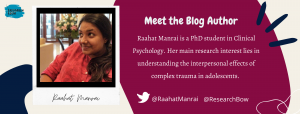PhD life is perceived to be all about research and knowledge and round table discussions about high-end intellectual ideas and what not. But is it though?!? This blog talks about my PhD journey so far, and how I managed or tried to manage expectations and the disasters that followed in the last three years. Please note that it might or might not be in a chronological order (You see we try to repress some memories and they don’t exactly come out in order)! Also, this blog might contain some spoilers.
P.S.- I also offer some unsolicited tips; trust me you’d want them for free, because doing a PhD is not cheap!
Expectation #1- And it begins!
When I started out my PhD; a whisker before the pandemic hit and how, I didn’t realise what I had signed up for. I hadn’t expected life to be taken by a metaphorical storm of social distancing, face masks, hand sanitizers and more. After an impending life transition, I expected the start of my PhD to be like that of a newly commissioned sergeant reporting for duty. I expected long working nights and caffeine-induced mornings. I was influenced by the dark brown and grey academia-aesthetic shown in movies and series and thought that 18th century salon inspiring intelligentsia would take over my lunch times. And I started taking on unnecessary stress, the very first week without realising there will be a lot of days for me to actually stress about.
And that is how I approached my first week. I went to my supervisors and meekly asked them during my very first supervision, “When would you like me to submit a draft?” To which they very quizzically chuckled, “Just take time to settle in, this time is very important for you to dip your toes in, understand what you’d want and think about some ideas.”
“Think about some ideas!! I already know what I want, I know how to get it done, so, what would I need to think about, I will just send them something by next month,” I thought to myself.
I remember walking up to a third year PhD student in the Postgraduate Research Office, asking them if I could look at their thesis because supervisors think it might be a good idea for me to start looking at different theses. To which they told me that even they hadn’t started looking at “different theses” because they hadn’t started writing.
I was used to a fast-paced world of productivity and outputs and suddenly, in what I gathered, one of the most advanced academic programmes (I mean there is nothing beyond a PhD, right!) I was asked to slow down. And boy, should I have taken that advice!
Unsolicited Tip #1-
The start of the PhD is definitely the augment of a very long, arduous and more often than not, slow chapter of our lives. Ideally, you’d want to take your time and get to know your surroundings a bit more. Try and gauge what is your working style and try to fit the PhD within your routine, rather than other way around! And more importantly, first year is meant to be the least stressful year of your life. You will have so many days where you will unwillingly be spending long working nights and caffeine-induced mornings. Enjoy your first year; you will miss it!
Expectation #2- The era of Teams, Zoom and beyond!
I don’t want to go on and on about how difficult it was to transition to a fully online, work from home, flexible, hybrid model, because everyone experienced the horror that was COVID-19, so here I will talk about how my expectations of working from home were shattered.
I was never a work from home kind of a person. I love structure and having a place to go to, for work. I would get distracted by mundane tasks of preparing meals, and doing laundry, so much so, that it would take up my whole day and very little would be left for work. So, when I would have weird dreams about how I was lagging behind in my PhD, I would wake up in the middle of the night to work on the supposed drafts I was to send my supervisors.
I don’t even have to mention how mismanaged that sounded because it was utterly wrong for me (in my own head, because it wasn’t the right working style for me)! And mind you, no one expects you to do that, because if you were able to do your PhD in 1 year, it would have been a Masters Dissertation, and not a project worthy of a doctorate!
Unsolicited Tip #2-
This goes back to what I was mentioning earlier. Use the first year to gauge and test your working style. You will try a lot of different techniques and that is a good thing. Try and attend different workshops, different courses, even if you don’t find them super relevant to your topic, you might hear some useful advice or meet some cool people who you will come to rely on during your super stressed days to come.
Expectation #3- Change is the only constant!
You must have heard the statement- ‘Your PhD will change, no matter what!’
Take that and run with it!
We come with these lofty ideals of what our PhDs should look like. But that saying ‘Woman plans, and God laughs’ couldn’t have been truer. Once we are in the world of academia, we often forget there is a reality outside the proverbial ivory tower. But ground reality is so different to what we construct in our heads. I didn’t take these ground realities into mind when starting my PhD, even when the pandemic hit. I just continued on my path of trying to control everything exactly how I planned it. I was the embodiment of a spinning top, which wasn’t leading anywhere. I would have had a much easier and less stressful time if I simply embraced change when it came, and by the way it did.
My PhD literally changed overnight and I was hesitant, concerned and literally threw a crying fit over how much my project had changed over time. To be fair, it was literally impossible to continue my project the way I had initially intended it to.
Unsolicited Tip #3-
We often come with our own ideas and expectations of what the start of our PhDs should look like with dew-eyed rigour. In some cases, it might not happen. However, in most cases these unexpected circumstances make your project more realistic and help you grow as a researcher. You will definitely learn new skills and flexibility is an important skill in academia.

Expectation #4- Self and others!
So much of your PhD is dependent on factors outside of yourself. There might be some days you feel like you are in full control of your progress, however, one of the most frustrating time points during your PhD journey is when you’re waiting for other people who are pivotal to your project. It could be waiting for feedback from your supervisors, hearing back from your collaborators, recruiting participants, just to name a few. I remember the frustrations when I would have to wait for other people to get back to me. And for someone as big of a control freak as I am, it was a learning curve and it still is!
Unsolicited Tip #4-
As I said, I am still learning how to deal with managing expectations vis-à-vis others, but it is always helpful to break down tasks into smaller ones, so you are not entirely dependent on others all at the same time. Another pro tip: sending clear deadlines helps others to work in conjunction with your own timelines. Another thing to remember is that PhD is partially about research, partially about learning how to solely manage a project, but it is an important life skill, both inside and outside academia.
Expectation #5- Reassurance needs to be asked for!
Doing a PhD is a very different experience from doing a taught degree programme. Everybody tries to prepare you that the PhD is about being independent and autonomous and working on your own, but no one tells you how much you rely on others for the majority of the work (referring back to the previous point). I remember the first time when I realised that things wouldn’t be handed down to me by the virtue of being a PhD student, but because I was a PhD student now, I needed to ask for it. And trust me it was tough, tougher than recruiting participants for my studies.
Unsolicited Tip #5-
If you need something, however abstract or concrete it may be, ask for it! *Enough said*
Expectation #6- You think you might know it, but you don’t!
At the risk of sounding redundant here, you come to a PhD with many preconceptions and things you have learned about yourself over the years. I remember the first time I got comments on my writing style, I questioned my entire life choices! Imposter syndrome took over and everything seemed like the end of the world.
Imposter syndrome is real and constructive criticism might sting sometimes but it is an important way to learn about yourself. As I have said before no one will hold your hand and help you navigate these things, but you will learn more things about yourself that will help you become a better PhD student! *Hopefully*
Just to be clear, this blogpost is somewhat inspired by real events, and some by observing people around me. I expect they might be helpful to students navigating the challenging PhD journey, and if not, please note that I am on a journey to learn how to manage my expectations, and I hope you do too.





